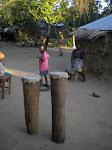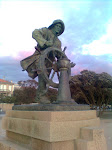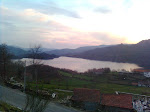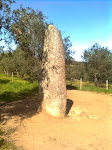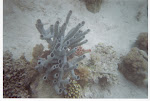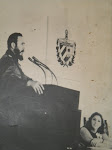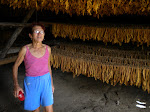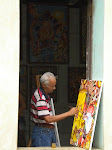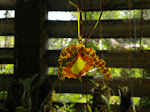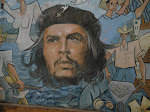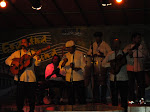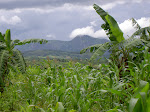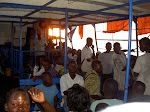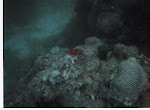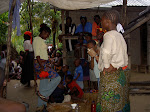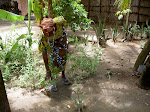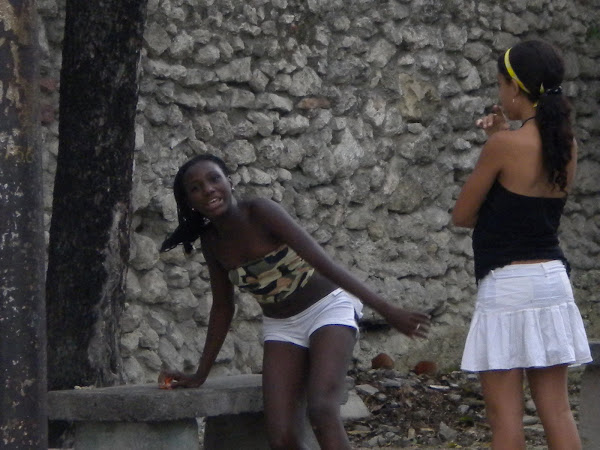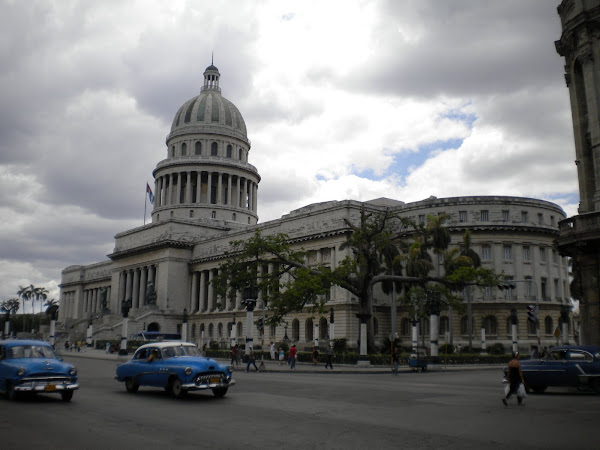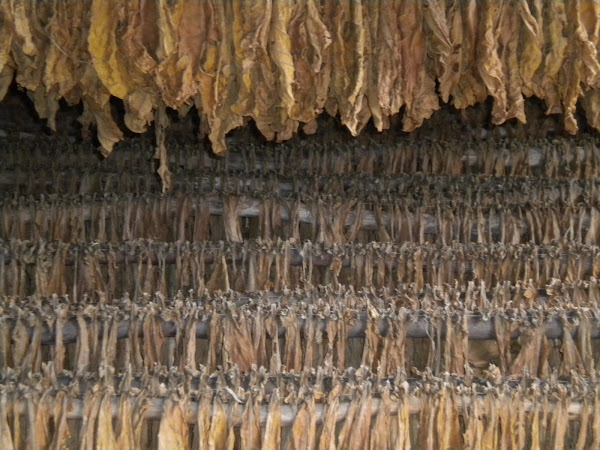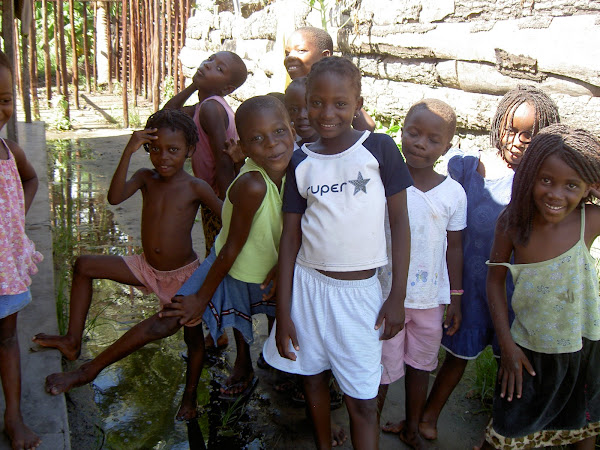Meia
volta Zen – tipo Inhacoda (estória a escrever da próxima vez). Não foi de
propósito, mas começou a chover. Tive que interromper. Já era demais.
terça-feira, 31 de março de 2020
2019, Novembro 9
Para mim, uma data memorável (não o ano!).
Choveu um pouco antes de ontem, ontem quase nada, final da tarde.
Vizinho diz que a época das chuvas não está atrasada.
Grande parte do terreno
do Campus, está preparado para a sementeira (pela população local de
Mucoboa). Roçaram, queimaram e cavaram.
A terra é milagrosa?!
quinta-feira, 26 de março de 2020
comentários inúteis...
Entretanto, estamos num país em Guerra. Na Gorongasa retomaram os ataques na Estrada nacional número 1, vários mortos e feridos; o Iossuf Momade, candidato à presidência da república pela Renamo, diz que não sabe de nada; existe um novo líder (provavelmento Shona, não muçulmano, general Nhungue), á frente da Junta Militar (que também diz que não é ele, tendo já feito várias ameaças, boicotar eleições, etc). Parece que de fato a reintegração daquela malta não aconteceu: Frelimo continua a controlar o esquema.
Na
província de Cabo Delgado, está uma verdadeira Guerra em curso, apoio dos
Russos, helicópteros, blindados, forças especiais, drones e bombardeamentos; os
Al shabat continuam a atacar, queimar aldeias e decapitar ou decepar pessoas;
morreu 1 russo.
A
estrondosa vitória da FRELIMO nas eleições Presidenciais, Parlamentares e
Provínciais, não está a melhorar nada! Continuam sem explicar o que se passa.
Mas a desigualdade social será sempre a determinante. Dizem os comentadores que
estamos em um Estado com múltiplos recursos, rico, mas mesmo assim, um estado
falhado. Não garante a segurança dos cidadãos!
Investigação de implementação: uma ferramenta de extensão em saúde?
Implementation
research methods: an extension tool in health education and information
Authors:
Paulo Henrique das Neves Martins Pires1
1Faculty
of Health Sciences, Lúrio University, Mozambique.
Implementation
research methods: an extension tool in health education and information
Abstract
Mozambique
has high maternal and new-born mortality rates. The Alert Community for a
Prepared Hospital care continuum project is an implementation research, aiming
to reduce maternal and new-born mortality rates in Natikiri, Nampula, Northern Mozambique.
Target groups (women, adolescents, heads of families, religious leaders,
community leaders, traditional midwives, counsellors of initiation rites,
traditional healers, secondary school pupils and teachers) were submitted to
repeated intermediate evaluations (surveys, interviews and focus groups
discussions), improving knowledge, attitude and practice on sexual and
reproductive health and rights and family planning. Implementation research
methods were an efficient extension tool in population health education and
health and educational professionals vocational training.
Keywords:
“behaviour change”, “data collection”
“health education”, “implementation research”, “Mozambique”, “research
methods”.
Abbreviations
FHS
– Faculty of Health Sciences.
FP
– Family planning.
MGH
– Marrere General Hospital.
MHC
- Marrere Health Centre.
NAP
– Natikiri Administrative Post.
SRH
– Sexual and reproductive health.
UniLúrio
– Lúrio University.
Introduction
Mozambique
has high maternal (451.6 maternal deaths per 100,000 live births in 2017) and
new-born mortality rates.1 The Alert Community for a Prepared
Hospital care continuum, is a project promoted by the Faculty of Health
Sciences (FHS) of UniLúrio (Lúrio University) in Nampula, Northern Mozambique
and the University of Saskatchewan (Canada), in partnership with Nampula
Provincial Health Directorate, the Marrere Health Centre (MHC) and the Marrere
General Hospital (MGH), the Natikiri Administrative Post (NAP) and other
non-governmental organizations with health sector activities in Nampula. This
is an implementation research aiming to reduce maternal and neonatal mortality.
The
activities had three target audiences, namely the population of Natikiri (peri
urban area, emacua linguistic ethical group, low level of education and
scarce economic resources), health professionals from the MHC and MGH and
policy makers in the health sector (at local, provincial and national levels).
Intervention
The
interventions took place from 2016 to 2020. We started with a baseline study,
with wide participation of target groups, to identify the causes of the
problems under study (maternal and neonatal high mortality rates) and possible
solutions. This approach allowed the design of 7 strategies and 20 objectives,
to be achieved with 80 different targets.2
The
implementation research method involves scheduled and repeated intermediate
evaluations, with data collection through surveys, interviews and focus groups
discussions, taking place in health units, at the university campus, at
secondary schools, at family houses and other public facilities. By complying
with the ethical guidelines of the Helsinki Declaration, participants receive
detailed information about the project (vocal explanation, written information
sheet to the participant, answers to personal questions), understand the
objectives and methods (informed consent form), presenting doubts and comments
to respondents and interviewers at the end of data collection. Data collection
were applied by FHS medical, nursing and pharmacy students and by masters in
Mother and Child Health, in Portuguese (Mozambican official language) or in
Macua (local language), as preferred by the subject.
Impact
We
know that in some cases of research the observer changes the observed,
introducing a data collection bias; in our case, this is one of the objectives,
improving the knowledge, attitude and practice of the NAP population on sexual
and reproductive health (SRH) and rights, contraception, family planning (FP),
maternal and children health, health prevention and health services quality.3
This objective can be achieved by transferring knowledge from surveyors,
interviewers and researchers to target groups.
In
the case of the NAP population, the participation of a large and diverse number
of people (women, adolescents, heads of families, religious leaders, community
leaders, traditional midwives, counsellors of initiation rites, traditional
healers, secondary school pupils and teachers, health professionals, health
committees members), in various data collection activities, has allowed the
dissemination of health information and education: for many participants, it is
a first occasion to talk openly about “culturally” sensitive issues rarely
discussed in the families and communities, to be considered and listened to as
to their opinions on the health problems and services and to clarify doubts in
a more "modern and scientific" way.
On
the other hand, the collection of data carried out by FHS students has allowed
their specific training in quantitative and qualitative research, reinforcing
their knowledge in SRH and FP and on the social and cultural reality of the
Mozambican Macua population.
Finally,
the team of teachers and researchers has been strengthening their ability to
study health problems, to design research protocols, innovating solutions and
discovering new areas of research and intervention.
Conclusion
We
consider that the data collection methods used in this implementation research,
can be an efficient extension tool in population health education, and health
and education professionals vocational training.
Acknowledgments
Iyara Mongo, Delmar Mutereda, Asimbawe Kiza and
members of Lúrio University Students Researchers group: Abraão João, Alvido
Muaviraca, Bondy Lourenço, Chabuca António, Felizardo Cabral, Jeremias Moquito,
Magaios Hassani, Ngulwe Saide, Rainer Araibo, Rossan Benjamim, Zubair Salamo.
Conflicts
of interest
The
author declare he has no conflicts of interest with study design or final
report, no financial or personal relationships with other people or
organizations that could inappropriately influence this research.
References
1
- INE. Resultados definitivos censo 2017. Instituto
Nacional de Estatística. República de Moçambique. Maputo. 2019. https://www.ine.gov.mz
2 - C. Belo, P. Pires, J. Josaphat, et al. Maternal
and new-born mortality: community opinions on why pregnant women and new-borns
are dying in Natikiri, Mozambique. International Journal of Research,
Volume 04 Issue 6 May 2017. p-ISSN: 2348-6848. E-IAAN: 2348-795x. http://edupediapublications.org/journals/
Importações.
O
Sol põe-se às 17:15, Vénus a poente Sudoeste às 17:45, 20º, Marte a poente
Sudoeste às 18h, 10º, com a Lua cheia a nascente. Vento fresco na caminhada.
O
resumo teo-filosófico é: os animistas, antes da idade da pedra (-70.000 –
10.000), detentores da revolução cognitiva (intersubjectivação = fofoquice =
gossip) articulavam, quase de igual para igual (entre aspas), com todos os
tipos de protagonistas (animais, plantas, rochedos, espírito, força vital,
diabo e outras). Os teístas foram convertidos pela revolução agrícola á
regularidade astronómica e converteram-se ao Deus criador, do homem e de tudo,
ou aos Deuses, idênticos; a revolução científica despoletou a nova religião, o
humanismo (liberal, socialista, evolucionista). O fracasso do humanismo
socialista, aliado ao triunfo “aparente” (teatral) do liberalismo, a sociedade
de consumo (sem esquecer as tecnologias de informação e comunicação), permitio
a dominação de um pequeno grupo de hipercapitalistas furiosos (HCF),
travestidos de neoliberalismo, exterminando a luta de classes: hoje, a
burguesia (que já quase não existe), não escravisa as massas de agricultores,
Pescadores e proletários; os algoritmos orientados pelos HCF instalaram-se nas
populações, disseminando a auto-escravisação. Uma possibilidade são as noivas
religiões: 1) o tecno-humanismo, 2) o dataísmo. Entretanto, nos países em
desenvolvimento, com muita ignorância e fome, igrejas, tradições e carências,
explosão demográfica e descoberta de recursos – o futuro ninguém sabe!
2019. 12 de novembro!
Na
sequência de uma leitura ótima, “Moçambique Neoliberal”, recebo uma visão
esclarecida da situação moçambicana, política, económica de saúde e da
educação. Está caótica!
domingo, 22 de março de 2020
4 de Novembro?
Resumindo a re leitura do Homo Deus, com a possibilidade das novas
religiões (o tecno humanismo e o dataismo) escravisarem o Sapiens como este
escravizou todos os outros animais, aniquilando-o mesmo como totalmente
desnecessário, associada à corrente de Moçambique Neoliberal, em que o
capitalismo selvagem travestido de humanismo consegue a auto-escravisação das
massas através das revoluções tecnológicas digitais – a rede – decidi: fazer o
balanço das linhas da teia em que estou metido: 91!
Bancos, 3, Emprego, 5, Estado, 1, Médica, 45, Redes sociais, 10, TIC,
10, Turismo, 3, UniLúrio, 14.
The future is now!
2019, outubro, 30!
Registar a história revela-se uma tarefa impossível.
A multiplicidade
de factos, sentimentos e imaginações, não cabe em escrita de diário.
A
complexidade da realidade objetiva, subjetiva e inter-subjetiva (estou a ler,
segunda vez, Homo Deus), não se deixa dominar – só por instinto?
Algoritmos de
sobrevivência!
Subscrever:
Mensagens (Atom)











































































































































































































































































































































































































































































































































































































































































































